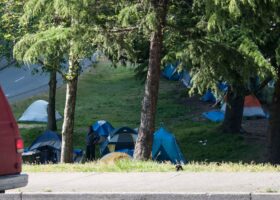Constantine places vulnerable people into unsafe living conditions
September 20, 2024
“I’m shook up. I want to get out of here. I don’t feel safe.”
This statement, from a resident of the public supportive housing complex at 1811 Eastlake (on the edge of Downtown Seattle), was stated hours after the latest murder at the 75-unit low-barrier facility. 42-year-old Steve Eden was stabbed more than 20 times in the early morning of August 29 and left to die in the complex’s laundry room.
Luckily, one camera in the building’s malfunctioning security system was able to record who went in and out of the laundry room and a multiple convicted felon, who was also a resident, was arrested for Eden’s death.
This was the second murder in nine months at 1811 Eastlake. Last November a 65-year-old man was killed from blunt injuries to the head. No one’s been arrested.
These murders are among the record number of deaths which continue to take place in King County, both on the street and in taxpayer-funded temporary housing. 415 homeless individuals died in 2023. This is a 34% higher than the 309 people who died in King County in 2022. Despite spending billions on the problem, homelessness in King County continues to worsen.
While King County Executive Dow Constantine emphatically states that these housing projects “give people the opportunity to reclaim their lives,” these murders and other violence prove that the millions local governments are spending on supporting these “low-barrier” housing (meaning sobriety and lawful conduct are not required) projects are simply taking all the problems associated with “living on the streets” and moving them indoors.
This demonstrates one of the fundamental flaws with the Housing First: If your housing “solution” is perceived as unsafe – which it will be if it doesn’t address mental health and addiction – people will simply remain on the streets, where at least dangers are less concentrated.
And because Executive Constantine believes “it is wrong” to believe addiction and mental health play a significant role in the county’s homeless crisis, very little treatment (if any) are offered to those suffering from these issues.
New documentary reveals miserable conditions
ChangeWA teamed up filmmakers Ginny Burton and Josh Hofland to produce a riveting new documentary, “Behind Closed Doors” (to be released September 25) which examines the violence, drugs, and bureaucratic malfeasance which are rampant at supportive housing projects overseen by Dow Constantine and King County.
Ginny brings her incredible experience (homeless drug addict with extensive criminal history who obtained a University of Washington degree after achieving sobriety) in interviewing everyone from supportive housing residents and staff to talking with Seattle Police Department leadership and Amy Smith, Chief of City of Seattle’s CARE Department (who described the resource drain these housing projects have on the city’s already understaffed police and fire departments).
The stories told are gripping and leave many wondering if Executive Constantine is aware of the conditions prevalent within his housing units.
Considering the recent murder at 1811 Eastlake, Ginny Burton asks some powerful questions:
“Why are there no requirements for tenancy inside of these buildings?”
“Why are we co-locating dangerous people with extremely vulnerable people?”
“Why are we leaving major decisions up to people who are unqualified to make them? The people inside of these buildings don’t know where to turn and they need our help.”
Sadly, the failure to protect those in supportive housing is another failure in the “housing-first” and “low-barrier” progressive philosophy which has caused homelessness figures to grow more than 60% since Constantine declared homelessness an emergency in 2015.
“Behind Closed Doors” will expose the myths that Constantine and his fellow progressives profess – that all personal struggles would go away if taxpayers purchased housing for all who are homeless.
Yet it is nearly impossible to imagine any homeless individual being able to “reclaim their lives” as Constantine promises, where there are murders, illegal drug activity, and on-going violence in their hallways and nearby units.
Addiction and mental health issues need to be the focus of helping these people become productive – both for their sake and for others around them who need to feel safe before making necessary changes in their lives.




